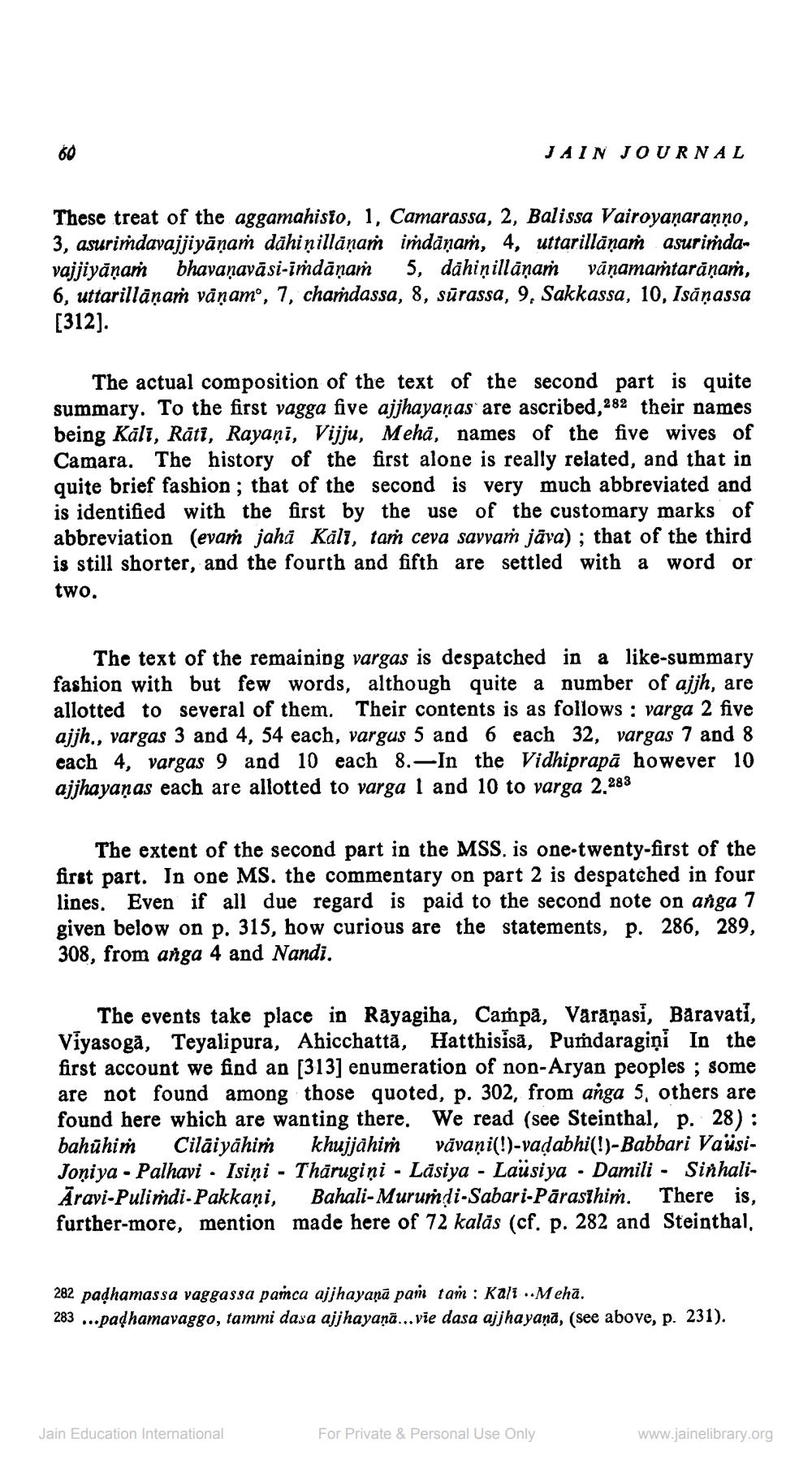________________
60
These treat of the aggamahisio, 1, Camarassa, 2, Balissa Vairoyaṇaranno, 3, asurimdavajjiyāṇaṁ dāhiṇillāņaṁ imdāṇam, 4, uttarilläṇam asurimdavajjiyāṇam bhavaṇavāsi-imdāṇam 5, dahiṇillāṇaṁ vāṇamaṁtarāṇaṁ, 6, uttarillāṇaṁ vāṇam, 7, chaṁdassa, 8, sūrassa, 9, Sakkassa, 10, Isāṇassa [312].
JAIN JOURNAL
The actual composition of the text of the second part is quite summary. To the first vagga five ajjhayaṇas are ascribed, 282 their names being Kāli, Rāti, Rayaṇī, Vijju, Mehā, names of the five wives of Camara. The history of the first alone is really related, and that in quite brief fashion; that of the second is very much abbreviated and is identified with the first by the use of the customary marks of abbreviation (evaṁ jahā Kālī, taṁ ceva savvaṁ jāva); that of the third is still shorter, and the fourth and fifth are settled with a word or two.
The text of the remaining vargas is despatched in a like-summary fashion with but few words, although quite a number of ajjh, are allotted to several of them. Their contents is as follows: varga 2 five ajjh., vargas 3 and 4, 54 each, vargus 5 and 6 each 32, vargas 7 and 8 each 4, vargas 9 and 10 each 8.-In the Vidhiprapa however 10 ajjhayaṇas each are allotted to varga 1 and 10 to varga 2.283
The extent of the second part in the MSS. is one-twenty-first of the first part. In one MS. the commentary on part 2 is despatched in four lines. Even if all due regard is paid to the second note on anga 7 given below on p. 315, how curious are the statements, p. 286, 289, 308, from anga 4 and Nandi.
The events take place in Rayagiha, Campa, Varanasi, Baravati, Viyasoga, Teyalipura, Ahicchatta, Hatthisisa, Pumdaragiņi In the first account we find an [313] enumeration of non-Aryan peoples; some are not found among those quoted, p. 302, from anga 5, others are found here which are wanting there. We read (see Steinthal, p. 28): bahūhim Cilaiyähim khujjahim vāvaṇi(!)-vaḍabhi(!)-Babbari VausiJoniya - Palhavi Isiņi - Thārugiņi - Lasiya - Laüsiya Damili - SinhaliAravi-Pulimdi-Pakkani, Bahali-Murumdi-Sabari-Parasthim. There is, further-more, mention made here of 72 kalās (cf. p. 282 and Steinthal,
Jain Education International
282 paḍhamassa vaggassa pamca ajjhayaṇā pam tam: Kali Mehā.
283 ...paḍhamavaggo, tammi dasa ajjhayaṇā...vie dasa ajjhayaṇā, (see above, p. 231).
For Private & Personal Use Only
·
www.jainelibrary.org




